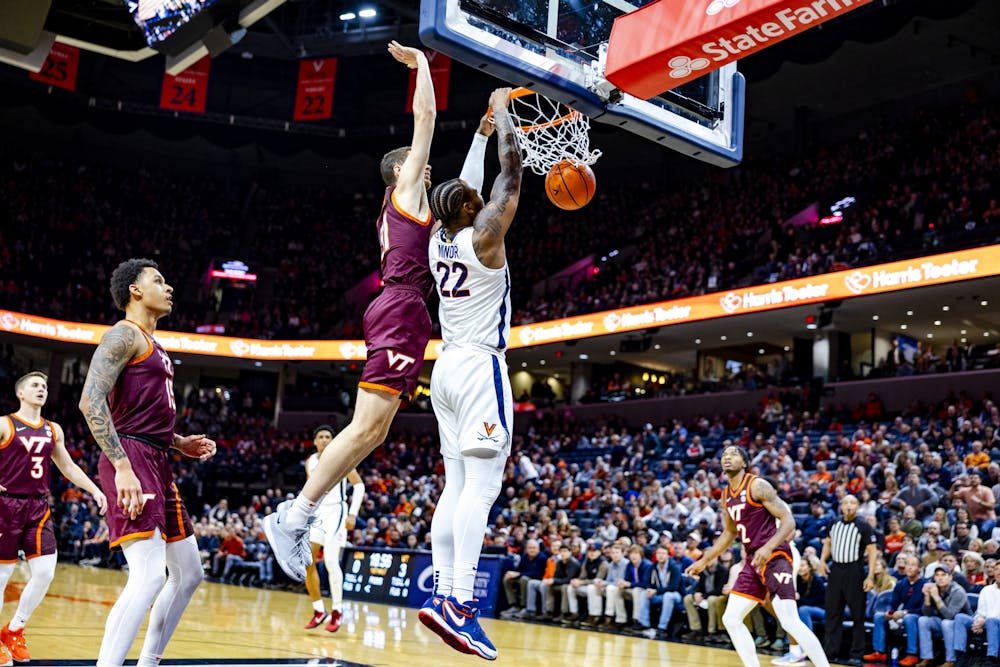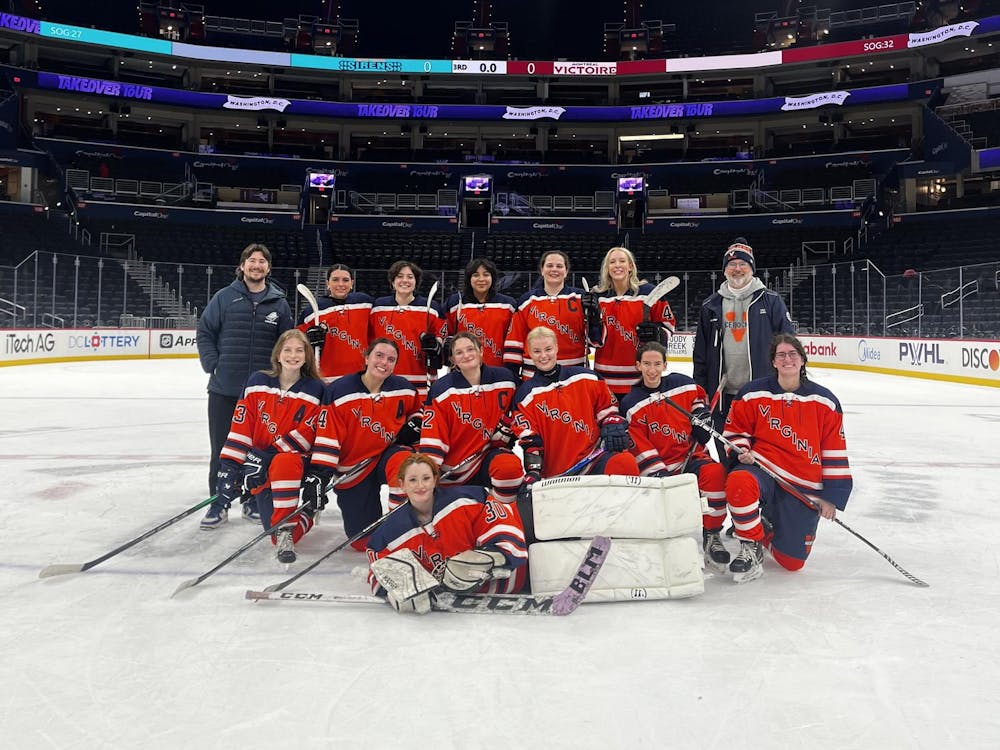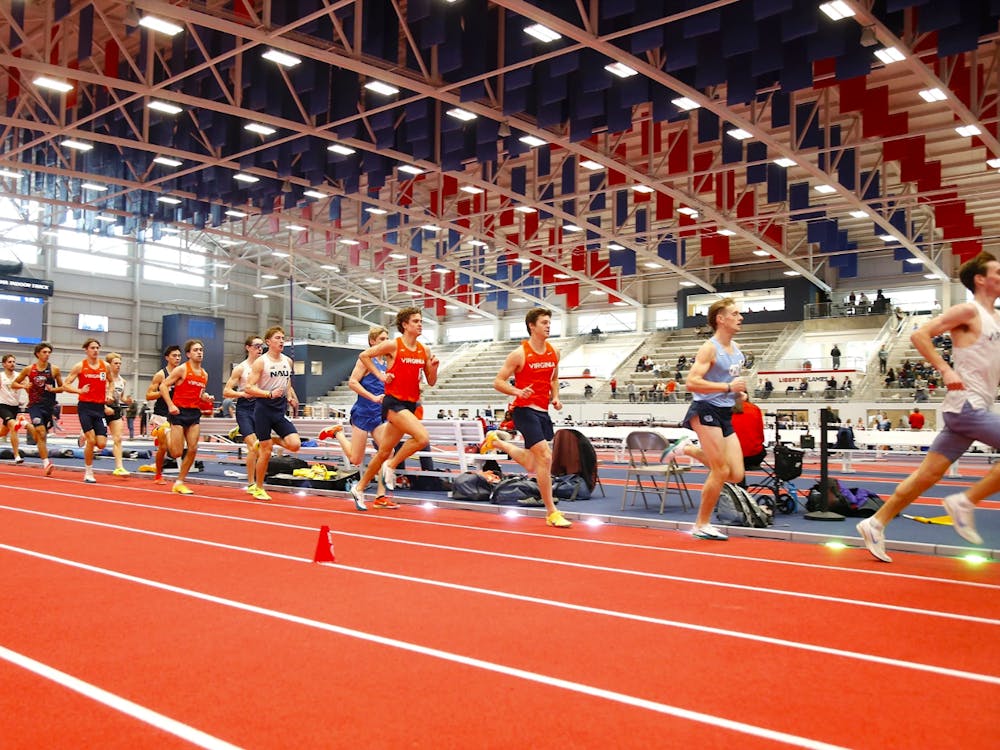Graduate transfer Jordan Minor arrived at Virginia after four formidable years at Merrimack, expected by many to provide an intimidating interior presence. In his first two months with the Cavaliers, though, he barely made a dent. That changed dramatically in Wednesday night’s showdown with Virginia Tech.
In front of a sold-out John Paul Jones Arena, midway through the second half, Minor brought the entire crowd to its feet. He had just spent two minutes dominating the game. He hammered home a dunk, then twice stymied Virginia Tech senior center Lynn Kidd defensively before bullying two defenders in the post for another two points.
That caused a Virginia Tech timeout and triggered the crowd’s explosion, sending sophomore guard Ryan Dunn leaping into the air to celebrate. Minor himself, meanwhile, roared in his own celebration, chest rising and falling in a moment of catharsis. Asked about his emotions during the game, Minor summed it up perfectly.
“A lot of fun,” Minor said. “Just letting the game come to me was the biggest thing. And then I kind of fed off the energy in the building. So I was definitely having fun, excited.”
Minor tallied 16 points, a team high and his season high, in his second consecutive start and second start of the season. Though the graduate transfer from Merrimack has recorded 71 double-figure games in his career, this was his first at Virginia. It has been a while coming.
“He just kept working,” Coach Tony Bennett said. “And he’s always been one of the most joyful guys, even when he wasn’t playing, though it hurt him. But he never gave up.”
So far this season, Virginia has bounced along a rocky path, oscillating between commanding home performances and unrecognizable away showings. One recurring issue has been the crippling lack of a forceful interior presence.
Minor’s emergence has delivered that presence. The 6-foot-8, 242-pound bruiser brings maturity and physicality. He is a strong deterrent inside defensively and an authoritative finisher at the rim offensively. Bennett even compared Minor to former interior pillar Jack Salt, and he spoke about the crucial presence Minor adds.
“We needed some real, legitimate, man strength down there,” Bennett said. “And he’s got that.”
Minor transferred this offseason from Merrimack College, a charming school tucked in a leafy part of Massachusetts that Minor ruled for four years. He won the NEC Defensive Player of the Year and Co-Player of the Year awards last season, on the way to the school’s first NEC Tournament title in just its fourth season transitioning from Division II to Division I.
But in his first 14 games at Virginia, the hulking 23-year-old seemed to shrink. He never played more than 12 minutes in any one game, never scored more than six points and did not play at all in two games. He missed defensive assignments and drifted around offensively. He struggled to acclimate to the packline defense. He looked, by all measures, lost.
The limited playing time took a toll. Minor talked about leaning on his faith to push through and focusing on working on his craft day by day.
Then, suddenly, it all came together for him. Minor unexpectedly started Jan. 13 against Wake Forest, playing 22 minutes and scoring 9 points. He started again against Virginia Tech and delivered again, continuing a startlingly abrupt ascension from bench fixture to major contributor.
The ascension started in unusual fashion. Minor played seven minutes at the end of the Jan. 6 game against North Carolina State, scoring six points and corralling three rebounds. Bennett liked what he saw in those seven minutes, and in practice leading up to the game.
“I thought he gave us a lift,” Bennett said. “Even though we were down 18, 20, 25, whatever it was. And he had been practicing better.”
Bennett also mentioned Minor’s improved defense, noting that Minor had started adjusting better to the packline, anticipating better and positioning himself better. That defensive improvement opened the door to more playing time.
Suddenly it seems like the missing ingredient to Virginia’s success has appeared. Ask Minor, though, and his focus is on the team. He sat at the interview podium after the Virginia Tech game soft-spoken and understated while discussing the team’s development.
“We’ve still got some things to figure out as a team,” Minor said. “I think we were much more disciplined today than we have been in the past, but we still got some steps to go, so I think it’s definitely a step in the right direction for sure.”
That step depended heavily on Minor, a committed teammate who overcame the unfamiliar and terrifying feeling of being relegated to the bench. His teammates, of course, have always noticed his commitment.
“He works each and every day, real hard, at his craft,” junior guard Dante Harris said. “When things don’t go his way, or he doesn't get as many minutes, he doesn’t get down or get to himself. He’s still in the game, encouraging his teammates.”
Perhaps that is why, as JPJ exploded around him Wednesday, Dunn charged onto the court to bump chests with Minor. Dunn and the rest of the team had watched Minor wait, game after game, for the opportunity that came Wednesday night – the moment that suggested Minor could be pivotal in Virginia’s search for success.
But Minor’s response, in that moment, said little about the future. Instead, it was all about one moment of catharsis — his hard work and patience had paid off.







